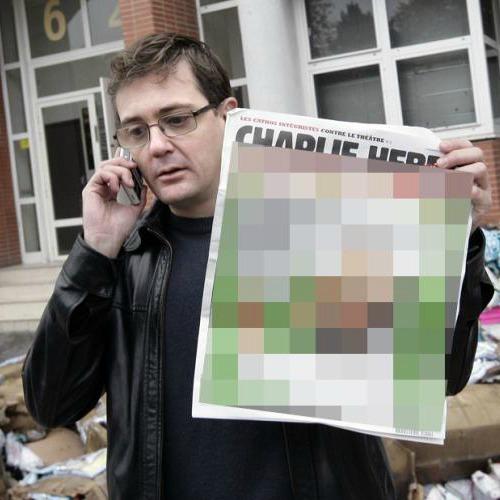BROOKE: Jeffrey Goldberg is a national correspondent for The Atlantic magazine. He arrived in Paris the day after the attack, when the city was papered with “Je Suis Charlie” posters in solidarity with the murdered cartoonists. On Thursday he wrote an article titled “We Are Not All Charlie” for TheAtlantic.com. He says the posters proclaiming that we are all Charlie, suggest we share its courage. He says journalists, at least, are not all as brave as the posters suggest.
GOLDBERG: Before we all congratulate ourselves on what great, brave avatars of freedom we all are, let’s just look at the reality of the situation and in our profession I don't see uniform bravery. Let's just call it that.
BROOKE: You wrote that to publish the cartoons now is a necessary but only moderately brave act. What is a brave act?
GOLDBERG: The staff of this newspaper was unbelievably brave. I remember in 2011 they had been firebombed already. They knew that they had targets on their backs. And they continued to do exactly what they wanted to do, which was to mock Islamist beliefs. And, by the way, I am not endorsing or decrying the content. I'm saying they were brave because they pursued the truth as they understood it. That's brave. I mean it is somewhat brave, as I say, for news outlets today to publish these. I was very glad to see that the Washington Post put a cartoon in its Op-Ed page. But now it's so widely disseminated. You defuse the danger because they can't possibly kill everyone. Going second or third of fourth is different than going first.
BROOKE: You wrote that CNN, the Associate Press, many other news organizations are cowering before the threat of totalitarian violence and represent something other than bravery.
GOLDBERG: I think so. I'm sorry to say it. But I think that both on sort of the straight moral grounds of saying to people who would have this profession self-censor, 'No, we're not going to do that. And in fact, in honor of these brave cartoonists who gave their lives for free expression, we're going to disseminate their work further.' I think that there's a solid argument to make there. But I think there's an even more solid, practical argument to be made, which is that these cartoons sit at the heart of this story. If you're not showing your readers and your viewers what these cartoons are, I don't think you're performing a service. Here's an analogy. And like all analogies, it's inexact -- but let's just say the President of the United States or another world leader used an FCC forbidden word in a speech. Or went on a rant that was not, shall we say, fit for a family newspaper. Do you report on it? Yes! Because it's the President of the United States. Because it's a world leader. Do you censor it because it's uncomfortable or unpalatable? No, I don't think you do. And I think that's the same thing that we're dealing with here.
BROOKE: Among the people that you say is not Charlie is Barack Obama. And you quote a speech that he delivered at the United Nations General Assembly in 2012.
OBAMA (Tape): The future must not belong to the people who slander the prophet of Islam. But, to be credible, those who condemn that slander must also condemn the hate we see in the images of Jesus Christ that are desecrated. Or churches that are destroyed. Or the Holocaust that is denied.
GOLDBERG: His line, 'the future must not belong to the people who slander the prophet of Islam', well, satire is one of the forces that created modern political freedom. I mean the ability to mock power is essential to creating democracy and openness across the world. So, in fact the future has to belong to those who would slander the prophet of Islam. We're not in the business of defending inoffensive speech. No one's standard is going to be like the next person's. I wish that what the President said is, 'Look we have sacred principles in the United States and one of them is freedom of speech. And one of the things we're allowed to do in America is mock religion beliefs. Another is to mock the President. You should see what they say about me. Is it painful to me? Yes. Is it painful to adherents of different faiths when they hear their religious beliefs mocked? Of course it's painful. I don't endorse blasphemy. But I defend the right of people to blaspheme.' That would have been, I think, a more American message, in line with our own sacred beliefs, if you will.
BROOKE: Jeff, thanks so much.
GOLDBERG: Thank you.
BACK ANNOUNCE: Jeffrey Goldberg is a national correspondent for The Atlantic magazine.

